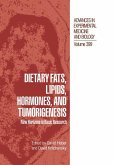The fifth of the annual research conferences of the American Institute for Cancer Research was held September l-2, 1994, at the L'Enfant Plaza Hotel in Washington, DC. Appropriately, in view of current directions in research, the theme was "Diet and Cancer: Molecular Mechanisms of Interactions". This proceedings volume contains chapters from the platform presentations and abstracts from the poster session held on the end of the first day. The subtopics for the tl;rree sessions held were "Retinoids, Vitamins A and Din Cancer Prevention and Therapy," "Choline and Lipids: Signal Transduction, Gene Expression and Growth Regulation," and "Dietary Factors and Regulation of Oncogenes, Growth and Differentiation. " A general overview on vitamins A and D emphasized that A and D, in addition to their established roles in vision, reproduction, and bone mineral homeostasis, may play significant roles in regulating cell function. Vitamin A metabolites, trans-retinoic acid and 9-cis-retinoic acid, regulate growth and differentiation. Furthermore, vitamin A deprived animals were more susceptible to both spontaneous and carcinogen-induced tumors. Epidemiological studies showed a correlation between low A intake and higher incidences of certain types of human cancers. Conversely, all-trans retinoic acid is useful in treatment and control of certain types of cancer. Physiologically, Vitamin D is converted to the active form, l ,25-dihydroxyvitamin D (VD). VD regulates hormone production and secretion, myocardial contractility, vascu 3 3 3 lar tone, and growth inhibition and differentiation.








